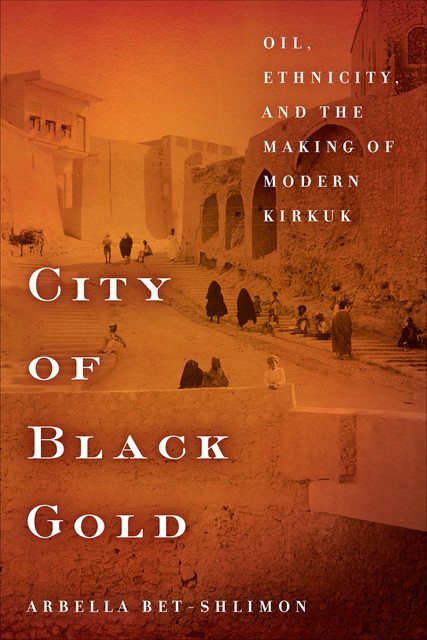Kami menggunakan cookie untuk meningkatkan pengalaman di situs web Bookmate dan rekomendasi kami.
Untuk informasi lebih lanjut, silakan baca Kebijakan Cookie kami.
Untuk informasi lebih lanjut, silakan baca Kebijakan Cookie kami.
Terima semua cookie
Pengaturan Cookie
Arbella Bet-Shlimon
City of Black Gold: Oil, Ethnicity, and the Making of Modern Kirkuk
“This fine social history of the city of Kirkuk, in northern Iraq, traces a century of political upheaval.” —John Waterbury, Foreign Affairs
Kirkuk is Iraq’s most multilingual city, for millennia home to a diverse population. It was also where, in 1927, a foreign company first struck oil in Iraq. Over the following decades, Kirkuk became the heart of Iraq’s booming petroleum industry. City of Black Gold tells a story of oil, urbanization, and colonialism in Kirkuk—and how these factors shaped the identities of Kirkuk’s citizens, forming the foundation of an ethnic conflict.
Arbella Bet-Shlimon reconstructs the twentieth-century history of Kirkuk to question the assumptions about the past underpinning today’s ethnic divisions. In the early 1920s, when the Iraqi state was formed under British administration, group identities in Kirkuk were fluid. But as the oil industry fostered colonial power and Baghdad’s influence over Kirkuk, intercommunal violence and competing claims to the city’s history took hold. The ethnicities of Kurds, Turkmens, and Arabs in Kirkuk were formed throughout a century of urban development, interactions between communities, and political mobilization. Ultimately, this book shows how contentious politics in disputed areas are not primordial traits of those regions, but are a modern phenomenon tightly bound to the society and economics of urban life.
Praise for City of Black Gold
“Blending smooth storytelling and sharp analysis, Arbella Bet-Shlimon challenges readers to rethink much of what passes as conventional wisdom about Iraq, and about power, oil, and ethnicity in the twentieth century. A wonderful book, richly documented, accessible, and creative.” —Toby C. Jones, Rutgers University
“City of Black Gold is essential for anyone interested in the modern history of Iraq and the roots of the standoff between the government in Baghdad and the Kurdistan regional government. Written with care and sensitivity, Arbella Bet-Shlimon’s history of Kirkuk is a delight to read.” —Joost Hiltermann, Middle East and North Africa Program Director, International Crisis Group
“This remarkable study of Kirkuk uncovers the ways in which the city became—and did not become—part of the Iraqi state. Arbella Bet-Shlimon bravely covers silenced histories, as she encourages us to look at Iraqi history through its northern urban peripheries. A fascinating urban history.” —Orit Bashkin, University of Chicago
Kirkuk is Iraq’s most multilingual city, for millennia home to a diverse population. It was also where, in 1927, a foreign company first struck oil in Iraq. Over the following decades, Kirkuk became the heart of Iraq’s booming petroleum industry. City of Black Gold tells a story of oil, urbanization, and colonialism in Kirkuk—and how these factors shaped the identities of Kirkuk’s citizens, forming the foundation of an ethnic conflict.
Arbella Bet-Shlimon reconstructs the twentieth-century history of Kirkuk to question the assumptions about the past underpinning today’s ethnic divisions. In the early 1920s, when the Iraqi state was formed under British administration, group identities in Kirkuk were fluid. But as the oil industry fostered colonial power and Baghdad’s influence over Kirkuk, intercommunal violence and competing claims to the city’s history took hold. The ethnicities of Kurds, Turkmens, and Arabs in Kirkuk were formed throughout a century of urban development, interactions between communities, and political mobilization. Ultimately, this book shows how contentious politics in disputed areas are not primordial traits of those regions, but are a modern phenomenon tightly bound to the society and economics of urban life.
Praise for City of Black Gold
“Blending smooth storytelling and sharp analysis, Arbella Bet-Shlimon challenges readers to rethink much of what passes as conventional wisdom about Iraq, and about power, oil, and ethnicity in the twentieth century. A wonderful book, richly documented, accessible, and creative.” —Toby C. Jones, Rutgers University
“City of Black Gold is essential for anyone interested in the modern history of Iraq and the roots of the standoff between the government in Baghdad and the Kurdistan regional government. Written with care and sensitivity, Arbella Bet-Shlimon’s history of Kirkuk is a delight to read.” —Joost Hiltermann, Middle East and North Africa Program Director, International Crisis Group
“This remarkable study of Kirkuk uncovers the ways in which the city became—and did not become—part of the Iraqi state. Arbella Bet-Shlimon bravely covers silenced histories, as she encourages us to look at Iraqi history through its northern urban peripheries. A fascinating urban history.” —Orit Bashkin, University of Chicago
lainnya
470 halaman cetak
- Publikasi asli
- 2019
- Tahun publikasi
- 2019
- Penerbit
- Stanford University Press
Sudahkah Anda membacanya? Bagaimanakah menurut Anda?
👍👎
fb2epub
Seret dan letakkan file Anda
(maksimal 5 sekaligus)


